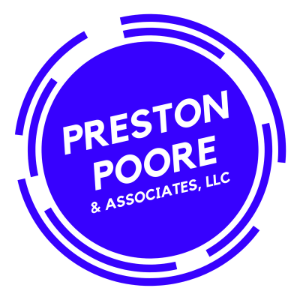Comedy Is Serious Business
My heart raced as adrenaline pumped through my body. l felt like thoroughbred entering the starting gate at the Kentucky Derby – rearing and ready to go. I’d been here so often before—those quiet moments just before you walk on stage.
The self-talk begins – with “don’t forget your lines,” “don’t trip,” and “don’t embarrass yourself.” But after thousands of presentations in my career, I’ve learned to adjust my self-talk to positive thoughts like “you’ve practiced and earned the right to be here,” “enjoy the moment,” and “don’t be hard on yourself when you mess up.”
But this time was different. I’d never performed a stand-up comedy routine in front of a live audience, 200 paying customers, including 20 family members and friends expecting to laugh. My anxiety emanated from potentially forgetting lines, bombing, or embarrassing myself and others.
I took three deep breaths. Then, I heard, “Let’s give a round of applause for Preston Poh…Pohr…Preston Poore…”
Here goes nothing. I bounced on stage and delivered my opening line. Who would have ever thought I’d perform a comedy routine at Atlanta’s The Punchline?
I’ve long wanted to learn the ins and outs of writing and delivering humorous content. It all began when I saw an Atlanta Journal-Constitution article on Jeff Justice’s Comedy Workshoppe. He’d been teaching comedic skills for 30 years and had roughly 3,000 people graduate from his class.
Why? I love to write and speak. Over the years, I’ve developed the ability to tell stories that stir every human emotional reaction except laughter. Let’s say I’m better at drama than comedy; a little intense and less laid back. I wanted to improve my ability to relate and connect with others.
Laughter enables human connection and accelerates bonding. Impromptu jokes among friends and family come easily to me. But I lacked confidence in intentionally tickling someone’s funny bone. During the Comedy Workshoppe, I discovered comedy is serious business; both art, and science. Over six weeks, I found my sense of humor and how to deliver it.
Here’s how the process worked. During each session, I was required to read a joke I’d written to Jeff and my 20 fellow participants. Jeff then provided feedback on how to improve the joke. I’d go home, integrate the input, rewrite the original joke, and create a new one. Then, the process began all over again.
For example, here’s the first joke I wrote about tipping:
I’m a little offended by the Covid era touchscreen payment systems. You know, the ones where you can tip before your meal, 18%, 20%, 25%, and you’re forced to choose. Ever notice there’s rarely a “no tip” option? It’s like they’re hustling me. How about adding a “isn’t a tip premature right now?” option… or a “how dare you!” option… or a “just give me my food and please don’t spit in it” option?
Here’s the final joke after Jeff and his team’s input:
Tonight, I was placing my order at Chipotle, and the cashier twisted the screen around, expecting a tip. HAVE YOU SEEN THAT? Doesn’t that drive you crazy? The display shows all of these options, like 20% and 30%. I asked, “where’s the just give me a freakin’ burrito and don’t spit in it option?”
The rewritten joke is tighter, recent, and has a more robust punchline. I wrote two “toppers” that expanded upon the original joke. We aimed to write and deliver a page and a half of the material at graduation. Eventually, I ended up with 15 jokes to tell over four minutes.
Before sharing my thoughts on how the routine went, let me pass along six brief insights I gained from the Comedy Workshoppe experience.
Feedback. Jeff told us that he wouldn’t let us fail if we worked hard and gracefully accepted feedback. Jeff and his team would rewrite jokes to shorten set-ups or strengthen punch lines. I always wanted to soak in the feedback provided by a professional comedian, someone who’s been there and done that. After all, I did pay $600 to participate in the workshop. Also, I observed that many people don’t accept feedback gracefully or ignore it all together. Many became defensive and argued with Jeff when he provided feedback or offered suggestions on how to improve. A couple of the aspiring comics rejected his joke developmental edits and delivery feedback all together. Listening to feedback, filtering through the essential parts, and implementing it will only make you better. Fools don’t listen and fail.
Delivery. Comedy is 90% delivery, as with any presentation. I’ve made thousands of presentations over my lifetime; dare I say, 10,000. I can easily throw up some PowerPoint slides on a screen and discuss the key points. But a stand-up comedy routine isn’t a presentation. Delivering a routine is more like acting. You’ve got to remember your lines, how to say your lines, and when to say your lines. It takes much more brain power to remember the set, from the opening joke to the closing call back. I’ve often said, “practice breeds confidence.” So, I practiced over 50 times while on walks, working out, in front of my ever-patient wife, driving, shopping, and almost anywhere.
Imperfection. My performance is far from perfect. Even with all the practice, I stumbled through some of my lines, lost where I was sometimes. Why? I’d never experienced an audience laughing at my original material or the distractions in a comedy club – waitpersons taking orders and serving drinks, sidebar conversations—a lot to process. After spending a lifetime trying to be perfect in front of others, I displayed some vulnerabilities. In the imperfections, I found myself connecting with the audience. I wasn’t polished, but I was relatable. I let my guard down and enjoyed being on stage, sharing some of my humorous takes and connecting with the audience. Additionally, I found that some improvising helps better connect with the audience.
Let ‘em laugh. Jeff hammered me during practice because I always talked over the audience’s laughter. During practice, I’d move to the next joke, more concerned about delivering the content than connecting with the audience. Jeff told me, “If they laugh, enjoy the moment. If they keep laughing, enjoy the moment as long as they do.” The laughter is the payoff. I get the high.
Encouragement. One of my fellow participants, Jason, took the workshop to challenge himself. During the first session, he told us that public speaking scared him to death. Like Jerry Seinfeld said, “People would rather be in the casket than deliver the eulogy.” But Jason’s stuff was hilarious. After watching him struggle on stage a couple of times, I sneaked up behind him and whispered words of encouragement. I told him that his content was fantastic, to have confidence, and believe in himself. Encouragement is oxygen to the soul. I watched Jason gain confidence during the workshop, and he ultimately delivered a hilarious graduation routine. After graduation, he approached me and thanked me for the encouragement; he said it helped him overcome his fear and believe in himself.
Stretch. John Maxwell’s Law of the Rubber Band states, “True life begins at the end of our comfort zone, and we arrive there by stretching.” I wanted to enlarge my comfort zone to become a more effective speaker and writer. My wife, Carla, will tell you that there were many nights I came home from the workshop frustrated. I struggled with self-confidence and potentially failing. I haven’t been pushed like that in years. But it was good, and I grew. You can too!
Back to The Punchline. I wrote four minutes’ worth of material but was on stage for approximately seven minutes. Why? A couple of reasons; I forgot my lines, and I let ’em laugh. I blinked, and it was over.
I got to stand on the stage where all the famous comedians performed, from Richard Prior to Robin Williams, Chris Rock to Jerry Seinfeld. All the greats. What a terrifying, humbling, and satisfying experience! I highly recommend Jeff Justice’s Comedy Workshoppe to anyone who wants to grow.
Would I do it again? Yes. Do I want to perform another comedy routine someday? Never say never. But I haven’t any desire to be a stand-up comic. No, that was never the aim. I desired to learn how to better connect with an audience or reader. Not only to educate, inspire, or make them cry but also to infuse some humor and make ‘em laugh.
So, where do I go from here? I want to integrate humor appropriately into my writing and speaking. I say appropriate because Jeff cautioned me never to tell jokes in front of a corporate audience. It can go wrong quickly. I witnessed it when a pro golf commentator presented at a Coca-Cola Company meeting and told off-color jokes. Everyone in the audience was uncomfortable, and the leaders who arranged the comic almost lost their jobs. It’s not worth it. But you can use humor to make a point.
Lastly, I leave you with a top-five list I developed with some of my fellow participants during a workshop exercise. We were challenged to create titles for the upcoming Rolling Stones tour that reference their age. All in fun…
#5 – The Jumping Jack Defibrillator Tour
#4 – The Can’t Get No Satisfaction Viagra Tour
#3 – The Depends for The Devil Tour
#2 – The Wild Horses Go to the Glue Factory Tour
#1 – The We’re Still Alive, and the Beatles Aren’t Tour
Oh yeah! One more thought. Jeff sent me a post-graduation email with the following line, “Super set! I know you loved last night as much as the audience loved you! Great sex!” I was flattered.
And now, here’s my PG-13 routine. Enjoy!
Please feel free to share the video with your family and friends. Many thanks!
Cheers,
Pres

Preston Poore
I help leaders lead—without the buzzwords or boring theories. After years in the Fortune 500 world, I’ve seen it all—bad bosses, great teams, and more leadership fails than I can count. Now, I share real stories, practical tips, and the occasional hard-earned lesson to help you lead with confidence. Let’s figure this out together.
Discover Your Life Purpose
Do you wake up each day dreading the idea of spending another day at work? If you’ve failed to discover and build your life around your life purpose, you might feel dissatisfied with your life. Flip the script! Get this special eBook, discover your purpose, and begin living a more fulfilling life today!
